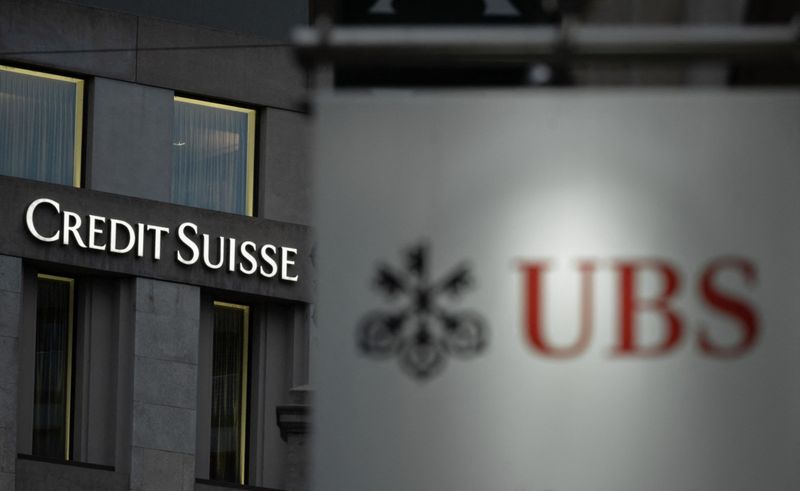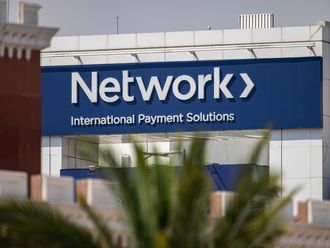
Highlights
- UBS to take over Credit Suisse with billions in SNB, state support
- Credit Suisse deal hands top holder $1 billion investment loss
- Holders of risky bonds face $17 billion wipeout
- HSBC, StanChart slump as fallout hits bank stocks, debt
- Fed, global central banks move to boost dollar funding
- Thousands of jobs at risk; Credit Suisse investment bank to shrink
Washington: Banking stocks and bonds plummeted on Monday after UBS Group sealed a state-backed takeover of troubled peer Credit Suisse Group AG, a deal that was orchestrated in an attempt to restore confidence in a battered sector.
In a package orchestrated by Swiss regulators on Sunday, UBS Group AG will pay 3 billion Swiss francs ($3.23 billion) for 167-year-old Credit Suisse Group AG and assume up to $5.4 billion in losses.
Credit Suisse shares slumped 62 per cent in premarket trade to a new low while UBS lost 7.1 per cent. Those sharp moves followed a day of heavy selling in Asian financial markets as early investor optimism about official efforts to stem a banking crisis quickly evaporated.
In particular, investor focus has shifted to the massive hit some Credit Suisse bondholders would take under the UBS acquisition, which has added to anxiety about other key risks including contagion, the fragile state of US regional banks and the challenges for central banks as they seek to contain inflation and financial risks.
"It should be clear that after more than a week into the banking panic, and two interventions organised by the authorities, this problem is not going away. Quite the contrary, it has gone global," said Mike O'Rourke, chief market strategist, Jones Trading.
"The reports that UBS is acquiring Credit Suisse will likely magnify Credit Suisse's problems by moving them to UBS."
Under the deal, the Swiss regulator decided that Credit Suisse additional tier-1 bonds - or AT1 bonds - with a notional value of $17 billion will be valued at zero, angering some of the holders of the debt who thought they would be better protected than shareholders in the takeover deal announced on Sunday.
Worries about what that might mean for holders of AT1 bonds issued by other banks added to persistent anxiety about a range of other risks including contagion, the fragile state of US regional banks and moral hazard.
Swiss authorities required that 16 billion Swiss francs in so-called additional tier 1 (AT1) bonds be written down in the mega-merger that was announced late Sunday.
The move will lead to an increase in the bank's core capital, the Swiss Financial Market Supervisory Authority (FINMA) said in a statement.
"The takeover will result in a larger bank, for which the current regulations require higher capital buffers," FINMA said.
AT1 bonds were created following the 2008 global financial crisis to put the burden of losses on investors instead of taxpayers.
Also known as CoCo, or contingent convertible bonds, they are a high-return investment but banks can suspend interest payments or convert them into bank shares in times of trouble. But Swiss authorities ordered that the Credit Suisse AT1s be written down altogether as past of the UBS deal, dealing a blow to the bondholders.
Credit Suisse said the bonds "will be written off to zero".
For their part, shareholders will get some three billion Swiss francs, or 0.76 francs per share - much lower than their closing price on Friday of 1.86 francs.
Standard Chartered Plc and HSBC shares each fell more than 6 per cent in Hong Kong on Monday to more than two-month lows, with HSBC facing the possibility of posting its largest one-day drop in six months. The MSCI index for financial stocks in Asia ex-Japan was down 1.3 per cent.
"It should be clear that after more than a week into the banking panic, and two interventions organised by the authorities, this problem is not going away. Quite the contrary, it has gone global," said Mike O'Rourke, chief market strategist, Jones Trading.
"The reports that UBS is acquiring Credit Suisse will likely magnify Credit Suisse's problems by moving them to UBS."
Crude oil declined, failing to hold onto an early advance, while copper was flat after giving up an initial 1.2% gain. Gold — which had benefited from the banking turmoil with a rally toward $2,000 an ounce last week — pared losses, suggesting that demand for havens remains a feature of trading. Read
Co-ordinated action
The shotgun Swiss banking marriage is backed by a massive government guarantee, helping prevent what would have been one of the largest banking collapses since the fall of Lehman Brothers in 2008. Pressure on UBS helped seal Sunday's deal.
"It's a historic day in Switzerland, and a day frankly, we hoped, would not come," UBS Chairman Colm Kelleher told analysts on a conference call. "I would like to make it clear that while we did not initiate discussions, we believe that this transaction is financially attractive for UBS shareholders," Kelleher said.
UBS CEO Ralph Hamers said there were still many details to be worked through.
"I know that there must be still questions that we have not been able to answer," he said. "And I understand that and I even want to apologise for it." In a global response not seen since the height of the pandemic, the Fed said it had joined central banks in Canada, England, Japan, the EU and Switzerland in a co-ordinated action to enhance market liquidity. The European Central Bank vowed to support euro zone banks with loans if needed, adding the Swiss rescue of Credit Suisse was "instrumental" in restoring calm.

On Monday, Credit Suisse's banking operations appeared to be business as usual at its major offices in Asia.
Monetary authorities in Singapore and Hong Kong, where Credit Suisse hosts large regional offices, separately said the Swiss bank's business continued without interruption.
And Credit Suisse urged its staff to go to work, according to a memo to staff seen by Reuters.
Shares of the British bank fell as much as 6.6%, the biggest drop in nearly six months, with the firm's AT1 bond falling more than 5 cents. That dragged on the broader benchmark Hang Seng Index, which was down 2.7%. Peer Standard Chartered Plc slid as much as 5.6%.
Some Asian banks' additional tier 1 bonds fell by a record Monday after a Swiss regulator said $17 billion of such products from Credit Suisse will be wiped out following the bank's sale. The turmoil is potentially sending the $275 billion market for bank funding into a tailspin.
Fed Chair Jerome Powell and US Treasury Secretary Janet Yellen welcomed the announcement by the Swiss authorities.
The Bank of England also praised the Swiss.
The greater risk environment for financials leads to husbanding of capital and risk-taking, less and more conservative investing and lending, and inevitably, lower growth," said Lloyd Blankfein, former chairman and CEO of Goldman Sachs Group Inc.
I would like to make it clear that while we did not initiate discussions, we believe that this transaction is financially attractive for UBS shareholders
Credit Suisse also told staff to inform clients that plans for its investment banking business will be communicated in due course as details of its acquisition by UBS were still being worked out, according to an internal memo.
"We do not expect there to be any disruption to client services. We are fully focused on ensuring a smooth transition and seamless experience for our valued clients and customers," a Credit Suisse spokesperson said.
Credit Suisse is also going ahead with its annual Asia Investment Conference in Hong Kong, starting on Tuesday, the spokesperson said.
Unresolved issues
Problems remain in the US banking sector, where bank stocks remained under pressure despite a move by several large banks to deposit $30 billion into First Republic Bank, an institution rocked by the failures of Silicon Valley and Signature Bank.
On Sunday, First Republic saw its credit ratings downgraded deeper into junk status by S&P Global, which said the deposit infusion may not solve its liquidity problems.
There are also concerns about what happens next at Credit Suisse and what that means for investors, clients and employees.
In the memo to employees, Credit Suisse said that once the takeover is complete wealth management clients may want to consider moving some assets to another bank if concentration was a concern.
The deal will also make UBS Switzerland's only global bank and the Swiss economy more dependent on a single lender.
"The Credit Suisse debacle will have serious ramifications for other Swiss financial institutions. A country-wide reputation with prudent financial management, sound regulatory oversight, and, frankly, for being somewhat dour and boring regarding investments, has been wiped away," said Octavio Marenzi, CEO of Opimas, in Vienna.
UBS chairman Kelleher told a media conference that it will wind down Credit Suisse's investment bank, which has thousands of employees worldwide. UBS said it expected annual cost savings of some $7 billion by 2027.
The Swiss central bank said Sunday's deal includes 100 billion Swiss francs ($108 billion) in liquidity assistance for UBS and Credit Suisse.
Credit Suisse shares lost a quarter of their value last week. The bank was forced to tap $54 billion in central bank funding as it tried to recover from scandals that undermined confidence.
"Please remember that, until this deal closes, Credit Suisse is still our competitor," Hamers wrote in a memo to employees. "We cannot discuss business matters with their employees or take any action that could be interpreted as a step toward the merging of business," he said.
The deal offers an "exciting moment" for UBS, and will help accelerate its strategy and strengthen its wealth management capabilities, Koh wrote. A spokesman for the bank confirmed the contents of the memo.
The transaction is expected to be completed by the end of the year if possible, Credit Suisse said in a statement Sunday.
Hamers will host a global town hall for staff at 9 a.m. CET Monday, the memo said.

Here are key takeaways from UBS's historic Credit Suisse deal
An emergency ordinance, a government backstop, and shareholders coming out better than some bondholders: UBS Group AG's government-brokered deal to buy Credit Suisse Group AG is historic, complex and unique.
The first merger of two banks both deemed systemically important since the financial crisis almost 15 years ago was put together in a matter of days. UBS is paying 3 billion francs for its battered rival in a deal aimed at avoiding a broader financial crisis. Switzerland backed the deal with a liquidity backstop, a guarantee to cover as much as 9 billion francs ($9.7 billion) of UBS's losses, and by waiving the requirement to get shareholder approval.
Here are the big takeaways:
The Terms
Credit Suisse shareholders will get UBS stock in a deal that values the bank at 3 billion francs. The firm was valued at about 7.4 billion francs at Friday's close, around 20 billion a year ago, and more than 100 billion at its 2007 peak.
The use of public funds mean that about 16 billion francs of additional Tier 1 notes be written off to zero. That means bondholders "- typically seen as more senior in a bank collapse than shareholders "- lost more.
Credit Suisse's statement said the deal is expected to close by the end of the year and UBS Chairman Colm Kelleher said there were no options for UBS to back out. Switzerland's government used an emergency ordinance to avoid the need for a shareholder approval.
Kelleher and UBS Chief Executive Officer Ralph Hamers will retain their roles in the combined entity. A representative for FINMA, the Swiss regulator, said at a Sunday press conference announcing the deal that Credit Suisse's management will stay in place until the deal closes. Then, their future becomes a decision for UBS.
"This acquisition is attractive for UBS shareholders but, let us be clear, as far as Credit Suisse is concerned, this is an emergency rescue," Kelleher said in the UBS statement.
Business Future
Kelleher was also clear that UBS is excited about Credit Suisse's wealth management business and Swiss business; not so much about its investment bank.
A UBS press release emphasized that the combined firm will have $5 trillion of client assets. And Kelleher said the firm was determined to keep Credit Suisse's profitable Swiss unit, despite concerns about concentration in the domestic market from this deal.
But the investment bank will be shrinking, likely ending the dreams of a CS First Boston spinoff.
"Let me be very specific on this: UBS intends to downsize Credit Suisse's investment banking business and align it with our conservative risk culture," Kelleher said at the press conference.
Job Cuts
Kelleher said it's too soon to know a job-cut number, but UBS gave indications it will be significant. The firm said it plans to cut the combined company's annual cost base by more than $8 billion by 2027. That's almost half of Credit Suisse's expenses last year.
The UBS chairman said he understands the coming months will be "difficult" for Credit Suisse staff and promises UBS will do what it can to keep the uncertainty as short as possible.
Government Support
Both banks have unrestricted access to the Swiss National Bank's liquidity facilities. And the Swiss government promised to swallow as much as 9 billion francs "arising from certain assets that UBS takes over as part of the transaction, should any future losses exceed a certain threshold."
The government's loss-guarantee was necessary because there was little time to do due diligence and Credit Suisse has hard-to-value assets on its books that UBS plans to wind down, Kelleher said. If that results in losses, UBS would assume the first 5 billion francs and the federal government the next 9 billion francs. Any further hits would have to be shouldered by UBS.
Klleher described that government guarantee as an "insurance policy" and said UBS's "significant first-loss" position means it has no incentive to use the guarantee unless absolutely necessary.












